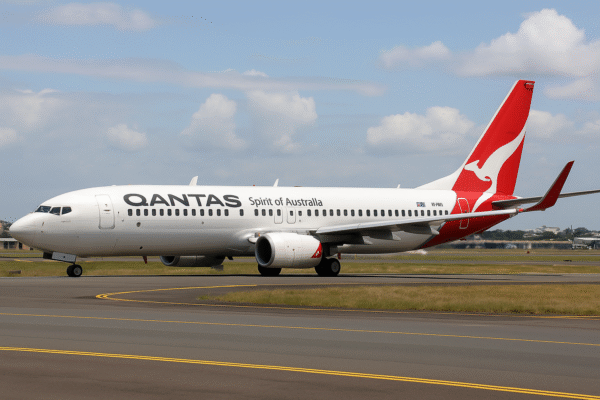Sydney, Australia — August 10, 2025 — Qantas Airways has announced the cancellation of 20 domestic flights over a three-day period — August 10, 11, and 12, 2025 — affecting key Australian cities including Sydney (SYD), Melbourne (MEL), Brisbane (BNE), Perth (PER), and Adelaide (ADL).
The cancellations, which coincide with one of Australia’s peak winter travel periods, have left thousands of passengers scrambling to rearrange their plans. The affected routes are among the country’s busiest domestic connections, used heavily by business travelers, tourists, and families alike.
Cities & Routes Affected by Qantas Cancellations
Sydney Kingsford Smith Airport (SYD):
- Flights to and from Melbourne, Brisbane, and Perth have been canceled, disrupting both commuter and leisure travel.
Melbourne Tullamarine Airport (MEL):
- Services to Sydney, Brisbane, and Adelaide are impacted, affecting intercity business links and holidaymakers.
Brisbane Airport (BNE):
- Cancellations include flights to Sydney, Melbourne, and Adelaide, with several morning and afternoon departures grounded.
Perth Airport (PER):
- Key east-coast connections to Sydney, Melbourne, and Brisbane have been disrupted, forcing travelers to rebook or delay journeys.
Adelaide Airport (ADL):
- Routes to Sydney, Melbourne, and Brisbane are among the cancellations, limiting access to major tourism and business hubs.
Possible Reasons Behind the Disruptions
Qantas has not issued a detailed statement on the cause of the cancellations, but according to the Australian Bureau of Meteorology, adverse weather patterns have impacted several major airports. Strong winds, heavy rainfall, and low visibility in multiple regions have created operational challenges for pilots and air traffic controllers.
Such weather events can lead to:
- Unsafe runway conditions
- Increased aircraft turnaround times
- Air traffic control restrictions
- Delays cascading across national flight schedules
Given Australia’s vast geography, weather disruptions in one city can quickly affect flight operations nationwide.
Impact on Tourism and Local Economies
The cancellations are a blow to Australia’s tourism sector, particularly in Sydney, Melbourne, Brisbane, Perth, and Adelaide, which collectively draw millions of visitors each year. These cities host a wide variety of attractions, including:
- Sydney: Sydney Opera House, Harbour Bridge, Bondi Beach
- Melbourne: Cultural festivals, laneway cafes, Great Ocean Road
- Brisbane: Riverfront entertainment, gateway to the Gold Coast
- Perth: Kings Park, Swan River, Margaret River wine region
- Adelaide: Barossa Valley, Adelaide Hills, cultural arts festivals
With peak tourist season underway, cancellations could lead to:
- Missed hotel check-ins and tour departures
- Lost revenue for restaurants and attractions
- Event attendance drops for conferences, festivals, and sporting events
According to Tourism Research Australia, domestic tourism contributes over $80 billion annually to the economy, and even short-term disruptions can have measurable impacts on local businesses.
Qantas Passenger Advice and Rebooking Options
Qantas is urging passengers on affected flights to:
- Check flight status via the Qantas app or website for live updates.
- Rebook through official channels to secure seats on alternative flights.
- Explore flexible travel options for trips that can be rescheduled.
Refund & Compensation:
- Passengers whose flights are canceled are eligible for rebooking at no additional cost or a full refund.
- Qantas’ customer service teams are working extended hours to handle inquiries.
Alternatives for Travelers
For those unable to secure a rebooked flight, alternative transport options include:
- Interstate trains (Sydney–Melbourne XPT, Brisbane–Sydney services)
- Long-distance buses (Greyhound, Firefly Express)
- Car rentals for shorter interstate routes
While these options may add travel time, they provide viable alternatives for urgent trips.
Tourism Sector Response
Industry bodies, including the Australian Tourism Export Council (ATEC), have called for greater collaboration between airlines, airports, and tourism operators to reduce the ripple effect of such disruptions. Recommendations include:
- Increased communication to travelers during peak tourism periods
- More flexible booking and cancellation policies for hotels and tour operators
- Expanded contingency transport links between major tourism hubs
Looking Ahead
Weather-related disruptions are a recurring challenge for Australia’s aviation industry, particularly during the winter months. As climate patterns become more unpredictable, airlines like Qantas are investing in:
- Real-time weather monitoring technology
- More adaptable flight scheduling
- Contingency staffing for peak disruption periods
In the meantime, travelers are encouraged to remain flexible, stay updated on travel advisories, and plan extra time for connections and transfers.
Bottom Line:
The Qantas cancellations in August 2025 have disrupted thousands of travelers across Australia, with major tourism and business hubs feeling the impact. As airlines, airports, and tourism operators work to manage the fallout, the situation serves as a reminder of the importance of contingency planning in modern travel.
For more travel news like this, keep reading Global Travel Wire
















